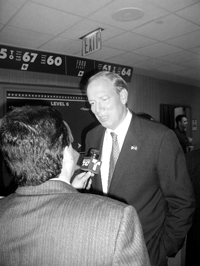G.O.P. delegates largely support move against gay marriage, but place emphasis elsewhere
“I think the vice president has been a great, positive influence on a number of issues,” New York Gov. George Pataki said, responding to a question about Dick Cheney’s comments last week opposing a federal constitutional amendment banning same-sex marriage. “Certainly that’s one of them.”
Cheney, appearing at a town hall meeting in Iowa on August 24, mentioned his lesbian daughter, Mary, and argued that the question of same-sex marriage should be left up to the states.
Pataki voiced his view of the vice president’s comments as he strode through Madison Square Garden Monday evening just prior to Republican National Convention appearances by Arizona Sen. John McCain and former New York City Mayor Rudy Giuliani.
But just like McCain and Giuliani, two leading Republicans whose high-profile appearances were widely viewed as an effort by Pres. George W. Bush’s campaign to project a moderate image to the national television audience, Pataki declined to use the convention as an opportunity to explicitly push the GOP in a more centrist direction. Asked by Gay City News whether he agreed with the vice president on the proposed Federal Marriage Amendment (FMA), supported by Bush, but defeated in its first Senate vote in July, the governor smiled, raised his eyebrows and said, “You know my position,” before turning to move on through the crowd.
Indeed, in late February, as debate raged about same-sex marriages that had been performed in San Francisco and, closer to home, in upstate New Paltz, Pataki’s spokesperson, Kevin Quinn, said, “The governor believes this is an issue that should be decided by the states, and as long as the federal Defense of Marriage Act is the law of the land, he does not currently see the need for a constitutional amendment.”
But Pataki himself has never uttered words of criticism about the amendment in public.
Not every elected Republican official at the convention was so reticent.
Asked whether he supported the FMA, Dan Mylott, the Republican mayor of Fitchburg, Massachusetts, a city of roughly 40,000 northwest of Boston, said, “No, I don’t. My opinion is that that issue belongs in the states and the federal government should not interfere with it.”
In fact, Mylott said he was not even certain that Massachusetts should pass a state constitutional amendment to overturn last November’s ruling by that state’s Supreme Judicial Court recognizing same-sex marriage rights.
“I would have to think about that,” he said on the convention floor Monday evening. “I’m against the fact that the state courts have made that decision. I think that was a mistake. I think that was wrong. But the other part of the issue is I believe that there should be civil unions. I’m not convinced that they should change the definition of marriage.”
In March, the Massachusetts legislature approved a constitutional amendment that would overturn the court’s marriage ruling while instituting civil unions, but the proposal will not go before voters until November 2006, and only if the Legislature approves the exact same language again in the next session beginning next January. While Fitchburg’s Republican mayor is not certain he supports the effort, the state’s junior U.S. senator, John Kerry, has endorsed it.
Lynn E. Olman, an Ohio state representative who serves Toledo, also voiced his opposition to the FMA, even as he reiterated his opposition to same-sex marriage.
“I voted in support of the current law in Ohio that defines marriage as the union of a man and a woman,” Olman told Gay City News Monday night. “I personally think that that [the FMA] takes focus away from things that we ought to be focusing on and I don’t think its an issue that we ought to be spending a lot of time on as Republicans.”
In fact, like Mylott, Olman is not certain he supports a constitutional amendment effort in his state, which may qualify for this November’s ballot.
“I really don’t know,” Olman said. “I don’t have any strong feelings one way or the other. I think the law is very clear on that in Ohio and I don’t think we need to go any further.”
But, Olman, Mylott and Pataki were clearly outliers among the roughly 20 G.O.P. delegates interviewed during the convention’s first evening on Monday.
Of the others, only Larry Doolittle, who retired after working for IBM for 33 years and lives in Kennesaw, Georgia, was willing to voice explicit doubts about the push for the FMA. When asked to name the most pressing issues Bush should be talking about in the fall campaign, Doolittle mentioned security and “moving our economy with tax cuts” and then said, “I think restoring our values and the morals to the country. Getting back to a values system, if you don’t have a values system you have anarchy. With freedom, you have to allow a certain amount of freedom, but you still have to have a values system for our rule of law.” But on the question of whether the FMA fit his goal of restoring values and morals to the nation, he said, “I don’t know. I think the party ought to look at that, and decide what makes sense.”
Though the other delegates interviewed signaled some measure of support for the FMA, nearly all of them emphasized that the war on terrorism, homeland security and the economy were far more important and compelling issues, both for them and for other voters back home.
June Cooper, the Kansas’ Republican national committeewoman, attended three previous national conventions and served on this year’s Platform Committee. Though she did not specify her position on the FMA or gay rights generally, she took pains to emphasize what she viewed as progress in opening the party up to diverse opinions.
“In the platform, it says ‘we respect and accept’ the differences in our party. It used to say ‘we recognize,’ so to me that means a lot,” she said, not mentioning that the Platform Committee rejected a more explicit plank, supported by gay, pro-choice and youth delegates, which would have acknowledged specific disagreement on abortion and gay rights. “I’m probably one of the moderates in the party. But I agree with 98 percent of what George W. Bush stands for. I don’t agree with 100 percent of what my husband says.”
Francisco Perez, a man in his 20s from the Logan Park neighborhood on Chicago’s northwest side, complained that in his Democratic-dominated hometown, “you know you really can’t express your ideas, you can’t try to promote family values and they tax, tax, tax and they are able to get away with [saying], ‘In the city, they’re the party of the rich and we’re the party of the poor,’ when that’s not true.” Perez contrasted what he saw as monolithic thinking among the Democrats with the diversity of opinion in his own party. Asked about Cheney’s dissent from the Bush view on the FMA, he said, “I think it’s an important division because it shows that the administration isn’t totally right wing because there’s going to be a debate about it.”
Nobody interviewed saw it as a problem for the party that Cheney and Bush disagree on the same-sex marriage amendment.
Other delegates, however, more clearly voiced their support for the effort to stop the same-sex marriage movement in its tracks.
“The vast majority of Wisconsin geographically is very conservative, so gay marriage is a factor in Wisconsin,” said Drew MacEwan, a county Republican chair from Sheboygan, which is about an hour north of Milwaukee. “I think the president’s done the right thing in terms of making a stand on what he believes and the voters wanted to hear that.”
“Voters in my area are socially conservative,” said Sam Wakim, a delegate from Mount Shasta in far northern California. “They believe strongly—I know that you are from a gay newspaper—but the area I represent believes strongly in the Defense of Marriage Act. I would say there is strong support for that particular message.” Asked whether it is an issue that Bush should be raising on the campaign trail, Wakim replied, “Certainly. It has been thrust upon him [by gay marriage activists].”
Gerald Woodley, a retired schoolteacher from New Ulm in southwest Minnesota, said that only some of the Republicans in his region were focused on conservative social issues.
“There are a number of conservatives especially within the party organization in southwest Minnesota that look at the gay marriage issue and take the pro-life position as a driving factor in their involvement,” he said. “For me, the important thing is electing a Republican president.” Woodley added, however, “I personally am pro-life. I personally believe in the amendment. But I guess those are not driving issues for me.”
Chip Brown, a public relations professional in Mobile, Alabama who enlisted in the National Guard at 32 in the wake of 9-11, perhaps best typified the balance that delegates who spoke to Gay City News placed on social issues relative to other questions facing the nation.
“Social issues are important,” he said. “But I think right now the most important issue is the national defense issue. I wouldn’t say [social issues] are a distraction. They’re important. But, I think there is room in this party for everybody. I subscribe to the Big Tent theory and know a lot of people who do.”
Married and with one child on the way, Brown knows he could be called up to service in Iraq.
“It’s a big decision,” he acknowledged. “I knew when I signed on the dotted line that—I would not like to go, but would go if I got called up and hopefully would serve with honor.”
Like all of the other delegates interviewed on Monday night, Brown was confident in the mission in Iraq, in its link to the war on terror, in the president’s stewardship of that war and in the basic health of the American economy. The opinions they voiced could not have been more at odds with the mood among protesters who filled New York’s streets this week.
The only sour note among the rosy sentiments expressed by delegates Monday evening came from Mike Crapo, the first-term U.S. senator from Idaho. Asked whether he had time to answer questions, he said yes. Upon hearing that the reporter was from Gay City News, however, Crapo waved his arm and muttered, “I’m not interested in an interview,” before turning away.
We also publish:
ADVERTISING



































